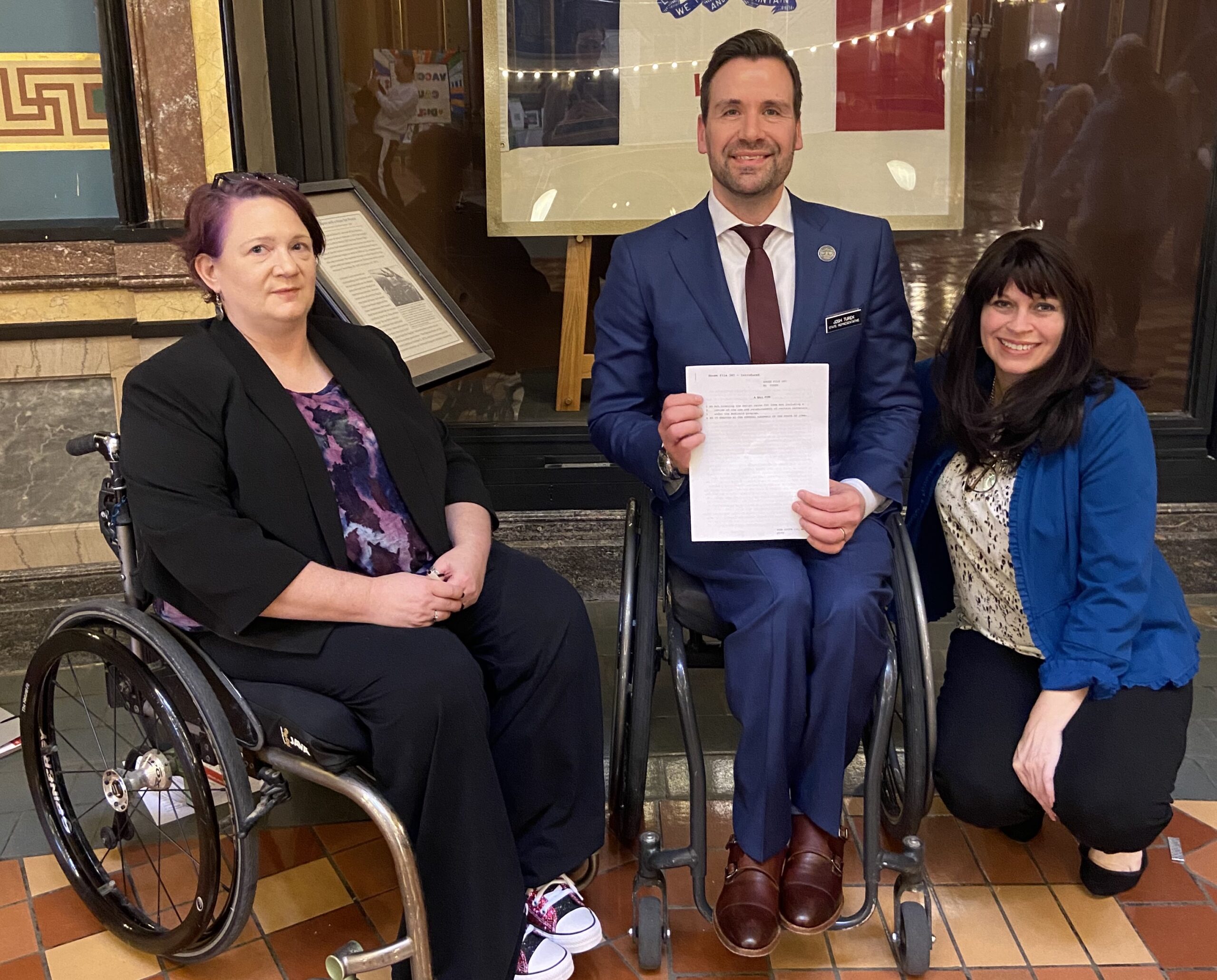Life’s defining moments often arise when you are forced to decide: will you protect yourself, or will you protect the people you serve? Those moments are never easy — and they may cost you more than you ever imagined. But these are the moments that matter, for they chart the course for the rest of your life.
I faced one of those moments two years ago when I co-authored the BetterCaths Act (H.F. 387) in Iowa with State House Representative Joshua Turek. It arrived after I spent six years trying to persuade urological industry leaders to fix a known chemical issue in some invasive medical devices that put catheter users at risk for much higher rates of cancer.
Most did the right thing, but some industry leaders refused — and doubled down on those of us raising the alarm. Josh and the BetterCaths team (30 wheelchair users plus me) never flinched. We charged forward. I have never regretted that decision — but I did pay a price in my career for it.

(L to R): Waverly, Iowa city Council Member Jenn Wolff; Iowa State Representative Joshua Turek; and Homecare executive Lisa Wells presenting the Better Caths for Iowans Act (H.F. 387) at the Iowa State Capitol in Des Moines.
Now, the Homecare industry has a career-defining choice to make that, either way, will chart the course of our future. The Big Beautiful (Awful) Bill has already passed, and the threat to Medicaid funding is no longer theoretical — it’s imminent. Cuts are coming, and with them comes an immediate and direct risk to the financial survival of our industry.
A Financial Cliff Hiding in Plain Sight
As HME executives, providers, and advocates, we like to think we’ve seen it all — competitive bidding, reimbursement squeezes, policy shifts — but what’s unfolding at this very moment could be the most devastating yet.
Let’s look at the reality. Many regional home medical equipment companies today operate with a payor mix that looks something like this:
• Medicaid – 60%
• Medicare – 30%
• Other Insurance – 10%
Just this week, I learned about a local HME provider up for acquisition that has a current Medicaid payor rate of 67%!
If you strip away nearly two thirds of your primary payor revenue, you don’t have a business model. You have a business obituary. For many providers, Medicaid isn’t just a revenue stream — it’s the lifeline that keeps the doors open and ensures vulnerable patients have access to equipment and care they can’t live without.
Why Survival Math Has Changed Forever
Some will say, “We’ve been through cuts before. We’ll adapt again.” But this time, the business math is different — and there’s no “waiting it out.”
We are staring at a perfect storm:
• Medicaid cuts deep enough to erase already impossibly low margins for providers with a high Medicaid payer mix.
• The return and expansion of Competitive Bidding that previously stripped Medicare reimbursement to the bone.
• Labor shortages and wage increases that make retaining skilled staff harder and more expensive.
• Supply chain inflation that has driven up costs across every category.
If more than 50% of your revenue comes from Medicaid — as many local providers experience — you cannot survive the resulting payor mix transition from rapid Medicaid dismantling by simply “flipping to cash pay.”
Our patients will not suddenly be able to afford their care out of pocket. If they could, or if family members were waiting in the wings to come to their financial rescue, they wouldn’t be on Medicaid.
When Personal Votes Betray Our Public Mission
I hear it all the time during election season: “I’m voting for the candidate who will lower my taxes.” And yes, personal financial relief sounds tempting — maybe that’s why your candidate of choice thinks you will fall for that every time they run.
But if that candidate also supports deep Medicaid cuts, here’s the trade-off you are making:
• Massive revenue loss for your company
• Layoffs in your workforce
• Inability to serve your patient base
• Potential closure of your business
You might save a few dollars in personal income tax — but you’ll lose your income entirely when Competitive Bidding kicks in as your largest payors, Medicare and Medicaid, crumble from the funding cuts that are already in motion.
The Hard Truth About Who We Fund
This is a career-defining moment for Homecare leaders everywhere. It is also a time when we must look inward at our personal choices.
Unfortunately, over the years, our industry has donated to lawmakers who are actively working to dismantle Medicaid — including Senator Joni Ernst (R-IA), who recently responded to concerns about Medicaid cuts by saying, “We all are going to die.”
Coverage from multiple outlets described Ernst’s comments as tone-deaf and mocking; she later posted a sarcastic apology video shot in a cemetery. It is beyond me how anyone in our field — especially those who publicly profess their mission as serving our patients — could reconcile her callousness with our work. And now, with the bill passed and the cuts locked in, continued financial support for candidates like this is not just short-sighted — it’s self-destructive.
Turning Alarm into Action
Now is the time for coordinated, skillful advocacy. That’s why, beginning in October, I’ll be working to equip our industry with better tools to influence the policy decisions that shape our future.
HME News has invited me to contribute a four-month Smart Talk advice column series on Storytelling for Legislative Change, with each article paired with a bonus educational video to help you apply the skills we cover:
1. Teaming with Your Industry Peers to Hit the Mark
How coordinated storytelling efforts with existing HME partner resources can amplify legislative impact.
2. Co-creating HME Customer Narratives for Change
Best practices for ethically partnering with customers to build powerful, authentic stories.
3. Leveraging AI to Guide Your Advocacy Campaign
Using emerging technologies to identify story trends, target messages, and elevate patient voices — including innovative uses for AI emcees in advocacy formats you may not have imagined possible.
4. Pitfalls in HME-Driven Storytelling
Common missteps when shaping narratives around home medical equipment legislation — and how to avoid them.
These resources are designed to strengthen the voices of HME providers everywhere, but they will only work if you use them. I urge you to take action too, for your customers’ sake, and for the sake of Homecare’s future.
A Proven Fighter for Homecare
When I first met him, Josh Turek was a freshman state house representative. Neither of us had ever written a policy bill. We were building the plane while flying it.
But we shared the same conviction: ensuring access to life-saving healthcare is worth whatever it costs you personally.
Born with Spina Bifida, Josh became a champion — in sports and in life — because the Shriners funded much of his necessary childhood healthcare. Without them, and public assistance, he would not have gone on to represent our country on the basketball court, or in elected office.
Now Josh, the medal-winning Paralympian you may remember from his days as an ATP for Numotion, is fighting to unseat Joni Ernst in Iowa’s U.S. Senate race. If he wins, he will be the only U.S. Senator in office who uses a wheelchair for reasons other than war.
Josh Turek is one of those leaders who will fight the good fight. You can help put him in a position to protect what matters most by supporting his campaign today at turek4iowa.com.
Your Choice Will Define Us and the Future of Homecare
So, this is my open and honest plea: choose Joshes, not Jonis—in government, in business, and in life. If you truly believe in protecting the people we serve, now is the moment to prove it. Support leaders who will defend Medicaid and halt Competitive Bidding, because the real cost of inaction isn’t just measured in lost revenue for the Homecare industry—it’s measured in the loss of our purpose, our integrity, and the trust our communities place in us.
The simple truth is, if you continue to stay silent while funding politicians who are actively working to dismantle our industry’s reimbursement—the cost we all pay will be far greater than any “promised” tax cut to your personal paycheck.
It will come at the cost of who we are as care providers, and whether we continue to exist. That is a price this industry, and our nation, simply cannot afford to pay.
 Lisa Wells is a healthcare marketing strategist, author, and advocate with over two decades of experience helping medical device and homecare brands grow and succeed. She has guided Homecare organizations to more than $350 million in acquisitions, authored multiple books on healthcare marketing and disability topics, and has developed several grassroots legislative advocacy campaigns to protect Homecare patients, including AAHomecare’s Save My Medical Supplies and Iowa’s “BetterCaths for Iowa Act.” As founder of Naturally Able, Inc., Lisa develops digital solutions that empower people with disabilities and chronic conditions.
Lisa Wells is a healthcare marketing strategist, author, and advocate with over two decades of experience helping medical device and homecare brands grow and succeed. She has guided Homecare organizations to more than $350 million in acquisitions, authored multiple books on healthcare marketing and disability topics, and has developed several grassroots legislative advocacy campaigns to protect Homecare patients, including AAHomecare’s Save My Medical Supplies and Iowa’s “BetterCaths for Iowa Act.” As founder of Naturally Able, Inc., Lisa develops digital solutions that empower people with disabilities and chronic conditions.

